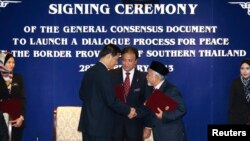BANGKOK —
Thailand has announced it will undertake peace talks with a Malaysia-based group that is linked with a Muslim-led insurgency in southern Thailand, which has killed more than 4,000 people since it erupted almost a decade ago.
The peace initiative, while welcomed, has raised concerns about whether the steps will be sufficient to end bloodshed and halt insurgent calls for greater autonomy in the largely Muslim southern provinces.
The talks, scheduled to begin on March 28, were agreed to in Kuala Lumpur by Thai National Security Council Secretary General Paradon Pattanathabutr and Hassan Taib, a senior Malaysian representative of the National Revolutionary Front, known by its Thai-language acronym BRN.
BRN is one of several groups seeking to establish an autonomous state in southern Thailand.
Other groups include the Mujahedeen Pattani Movement, the long-standing Pattani United Liberation Organization, Pattani Islamic Mujahedeen Movement, the Mujahedeen Islamic Pattani Group, the National Revolution Front, Pattani Liberation National Front, Jemaah Islamiyah and Runda Kumpulan Kecil.
Secretary-General Paradon told a Thai parliament house committee other insurgent groups will be invited to the talks.
Angkhana Neelapaijit, president of the non-governmental organization Working Group on Justice for Peace in the South, says the Thai government needs to build greater trust in local communities for the talks to succeed.
“I think it is too fast for any negotiation, because I think we have a lot of [insurgent] groups of people who think different," she said. "We need to be very careful and need to talk with all the stakeholders."
Thai officials and human rights analysts say the talks in Malaysia followed lobbying by former leader Thaksin Shinawatra, who fled Thailand in 2008 to avoid a two-year jail term for corruption, but who remains a key decision maker behind the government.
Human Rights Watch’s Sunai Phasuk says Thaksin has used his close ties with Malaysia’s government to press for talks.
"Thaksin’s close friendship with ... with Malaysian Prime Minister Najib Razak and [other] personal friendships ... have been mobilized to get the Malaysian special branch police to pressure insurgent elders from the BRN Coordinate to come to the negotiation table," he said.
Sunai says the condition calling for insurgents to surrender the armed struggle for creation of an independent Pattani was added at the insistence of both Malaysia and Thaksin.
In Yala Province’s key city of Betong, hotel general manager Bunchong Wong says the local economy, especially tourism, would benefit from an agreement that leads to a reduction in violence.
“In the first step it is good, but the commander, the authority officer, should negotiate with the other groups, because there are four or five or six groups," said Bunchong. "If the people have got safety and security, it’s okay; surely my business will be better than last year.”
Analysts say the success of the talks still lie in addressing key grievances in the Southern border provinces, including an end to discrimination against Muslim communities.
The peace initiative, while welcomed, has raised concerns about whether the steps will be sufficient to end bloodshed and halt insurgent calls for greater autonomy in the largely Muslim southern provinces.
The talks, scheduled to begin on March 28, were agreed to in Kuala Lumpur by Thai National Security Council Secretary General Paradon Pattanathabutr and Hassan Taib, a senior Malaysian representative of the National Revolutionary Front, known by its Thai-language acronym BRN.
BRN is one of several groups seeking to establish an autonomous state in southern Thailand.
Other groups include the Mujahedeen Pattani Movement, the long-standing Pattani United Liberation Organization, Pattani Islamic Mujahedeen Movement, the Mujahedeen Islamic Pattani Group, the National Revolution Front, Pattani Liberation National Front, Jemaah Islamiyah and Runda Kumpulan Kecil.
Secretary-General Paradon told a Thai parliament house committee other insurgent groups will be invited to the talks.
Angkhana Neelapaijit, president of the non-governmental organization Working Group on Justice for Peace in the South, says the Thai government needs to build greater trust in local communities for the talks to succeed.
“I think it is too fast for any negotiation, because I think we have a lot of [insurgent] groups of people who think different," she said. "We need to be very careful and need to talk with all the stakeholders."
Thai officials and human rights analysts say the talks in Malaysia followed lobbying by former leader Thaksin Shinawatra, who fled Thailand in 2008 to avoid a two-year jail term for corruption, but who remains a key decision maker behind the government.
Human Rights Watch’s Sunai Phasuk says Thaksin has used his close ties with Malaysia’s government to press for talks.
"Thaksin’s close friendship with ... with Malaysian Prime Minister Najib Razak and [other] personal friendships ... have been mobilized to get the Malaysian special branch police to pressure insurgent elders from the BRN Coordinate to come to the negotiation table," he said.
Sunai says the condition calling for insurgents to surrender the armed struggle for creation of an independent Pattani was added at the insistence of both Malaysia and Thaksin.
In Yala Province’s key city of Betong, hotel general manager Bunchong Wong says the local economy, especially tourism, would benefit from an agreement that leads to a reduction in violence.
“In the first step it is good, but the commander, the authority officer, should negotiate with the other groups, because there are four or five or six groups," said Bunchong. "If the people have got safety and security, it’s okay; surely my business will be better than last year.”
Analysts say the success of the talks still lie in addressing key grievances in the Southern border provinces, including an end to discrimination against Muslim communities.











